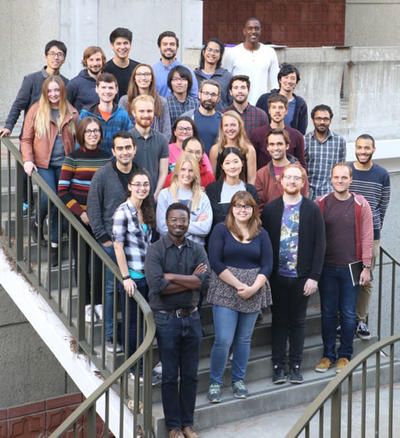 Photo: Members of the Richmond Sarpong Lab.
Photo: Members of the Richmond Sarpong Lab.
The Center for Computer Assisted Synthesis (C-CAS) has been chosen as a new Center of Chemical Innovation nationally this year by the National Science Foundation. Richmond Sarpong of UC Berkeley joins Olaf Wiest (center director) and Nitesh Chawla of Notre Dame, Abigail Doyle (Princeton University), Robert Paton (Colorado State University) and Matthew Sigman (University of Utah) as principal investigators to collaboratively direct research and experimentation at the C-CAS.
Supported by the National Science Foundation, the team plans to create tools for a new generation of ‘data chemists’ by exploring the use of computers and machine learning to streamline how complex molecules, which form the basis for over 50% of the medicines on the market, are made.
The goal of C-CAS is to combine data science and machine learning with chemistry to transform how the synthesis of complex organic molecules is planned and executed. As a result, this new generation of data chemists and machine learning scholars can be trained and educated to address complex challenges of modern synthetic chemistry.
“The ability to meld the power of computation with the science and art of building molecules is long overdue,” Sarpong said. “I think students involved in this endeavor will find it highly enabling.”
Both graduate and undergraduate students will participate in the Center’s research, which will also establish networking events, online workshops and collaborations with students at various schools.
C-CAS is supported by the Centers for Chemical Innovation Program of the Division of Chemistry and will include $2 million in funding. Two to three centers are created each year with nine currently in existence. As a “Phase One Center”, C-CAS will run for three years and, pending the outcome, potentially be extended and considerably expanded into a “Phase Two Center”.
In 2017, NSF announced its ‘10 Big Ideas,’ encompassing a long-term research agenda to benefit generations to come. The C-CAS team falls under ‘Harnessing the Data Revolution’. The ‘Data Revolution’ is a term used to describe the growing demand for data from all parts of society. It has impacted many fields, and chemistry is now one of those.
In addition to working with researchers at various institutions, the C-CAS group will work with a number of industrial partners such as large pharmaceutical companies.
Stay up-to-date on the research at C-CAS by visiting ccas.nd.edu.
